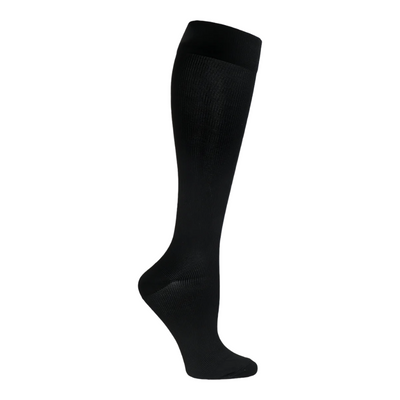How long should you wear compression socks?

How long to wear compression socks?
Usually, compression socks are worn for about 2-8 weeks after the surgery. Wear them day and night at any time except showering and bathing. It is recommended to get at least 1 extra pair to have on hand while cleaning the other.
Which socks to wear and how long you should wear them depends on your type of injury or ailment. You should always consult a doctor and follow your doctor's recommendation for your condition.
Here are the most common compression socks and treatment times for common surgeries:
Knee Surgery
Your doctor may recommend the knee-high sock either 20-30mmHg or 30-40mmHg. The socks should be worn for this type of recovery all day for about 6 weeks. Your doctor may recommend that you sleep in the stockings and only take them off to wash them. Buy two pairs, so you have another pair to wear while cleaning one or more if you cannot wash them daily.
Hip Surgery
Your doctor may recommend the knee-high sock either 20-30mmHg or 30-40mmHg. Your doctor may recommend the knee-high sock, either 20-30mmHg or 30-40mmHg. You should wear the support socks all day and possibly at night for about 6 weeks. Your doctor may recommend that you sleep in the stockings and only take them off to wash them. Buy at least two pairs of socks to have another one available to wear while cleaning one.

|

|
 |
How long should you wear compression stockings after major surgery?
Surgery in which you are under anesthesia for more than 90 minutes will affect your mobility and increase your risk of developing a blood clot. Some major surgeries include Appendectomy, Bypass Surgery, Joint Replacement, Gallbladder Removal, Angioplasty, Hysterectomy, and more. Doctors recommend wearing compression socks day and night, only taking them off to wash and change them for 6 weeks after surgery for most, but not all, patients. Please consult your doctor, who is familiar with your particular health requirements, for specific recommendations.

Other injuries and the best compression socks to treat them
Ankle Sprain or Break
Wear the crew sock 10-20mmHg for 8-12 hours a day for about 4 weeks, but not while sleeping.
Calf Strain
Wear the knee-high sock 20-30mmHg for 8-12 hours a day for about 4 weeks, but not while sleeping.
Knee Injury
Wear the knee-high sock 20-30mmHg all day for about 6 weeks, but not while sleeping.
Groin or Hamstring Injury
Wear the knee-high sock 20-30mmHg all day for about 4 weeks, but not while sleeping. If pain persists, you can move down to the 10-20mmHg compression sock.
Compression stockings after minor surgery
Do you need to wear compression socks after minor day surgery? The answer is yes. You will experience some swelling, and there is still some risk of blood clots. Compression socks reduce swelling and boost circulation, which helps speed up recovery time by bringing nutrient-rich blood to the affected area. Compression socks will help you heal faster, even if your surgery was above your waist.
Other common conditions treated by compression socks are:
- Varicose Veins prevention and treatment
- Edema (Swelling in your legs and feet)
- DVT (Deep Vein Thrombosis)
- Lymphedema
- Kidney Disease
- RLS (Restless Leg Syndrome)
Varicose Veins
Compression socks are the first plan of action to treat your varicose veins. Compression is also the best step to help prevent them. Even if you are considering surgery to correct the appearance, the first approach is to wear compression stockings for three to six months.
Read more

Edema
Edema or swelling can have many causes, which can be as minor as standing for too long, or it could be the symptom of something much more severe. An injury, pregnancy, certain medications, kidney disease, vein damage, heart failure, and more can swelling. Wearing compression stockings provides relief from swelling and comforts tired, achy legs.
Deep Vein Thrombosis
DVT is a medical condition when a blood clot forms in a vein deep inside your body. A blood clot is a clump of blood turned into a solid, making average blood circulation slower. Deep vein blood clots usually form in the lower part of the legs, the calf or thigh, but can be found in other parts of your body.
Read more
Primary and Secondary Lymphedema
Lymphatic obstruction or lymphedema is caused by damage or blockage of lymph nodes resulting in excess fluid retention in tissues and swelling.
Read more
Kidney Disease
When you experience kidney failure, the kidneys are unable to process the extra fluid from your body. That is when the excess fluid builds up in certain parts of the body, causing swelling.
Read more
Restless Leg Syndrome
The restless leg syndrome, also known as the Willis-Ekbom disease, is a problem in the nervous system characterized by an unpleasant feeling in the legs, resulting in an irresistible urge to move.
Read more
Who else should wear compression socks?

Almost anyone can benefit from Skineez® compression socks. Workers who stand on their feet all day, athletes, business travelers who sit for long periods either flying or riding, anyone who experiences tired swollen feet.
Why Skineez® Compression Socks?
Skineez® Skin-Reparative is the only medical-grade compression brand clinically proven to protect your skin. Skineez's garments are constructed with technical fibers and infused with FDA-Cleared, Skin-Reparative ingredients that protect your skin and make the fabric incredibly soft and easy to put on.




